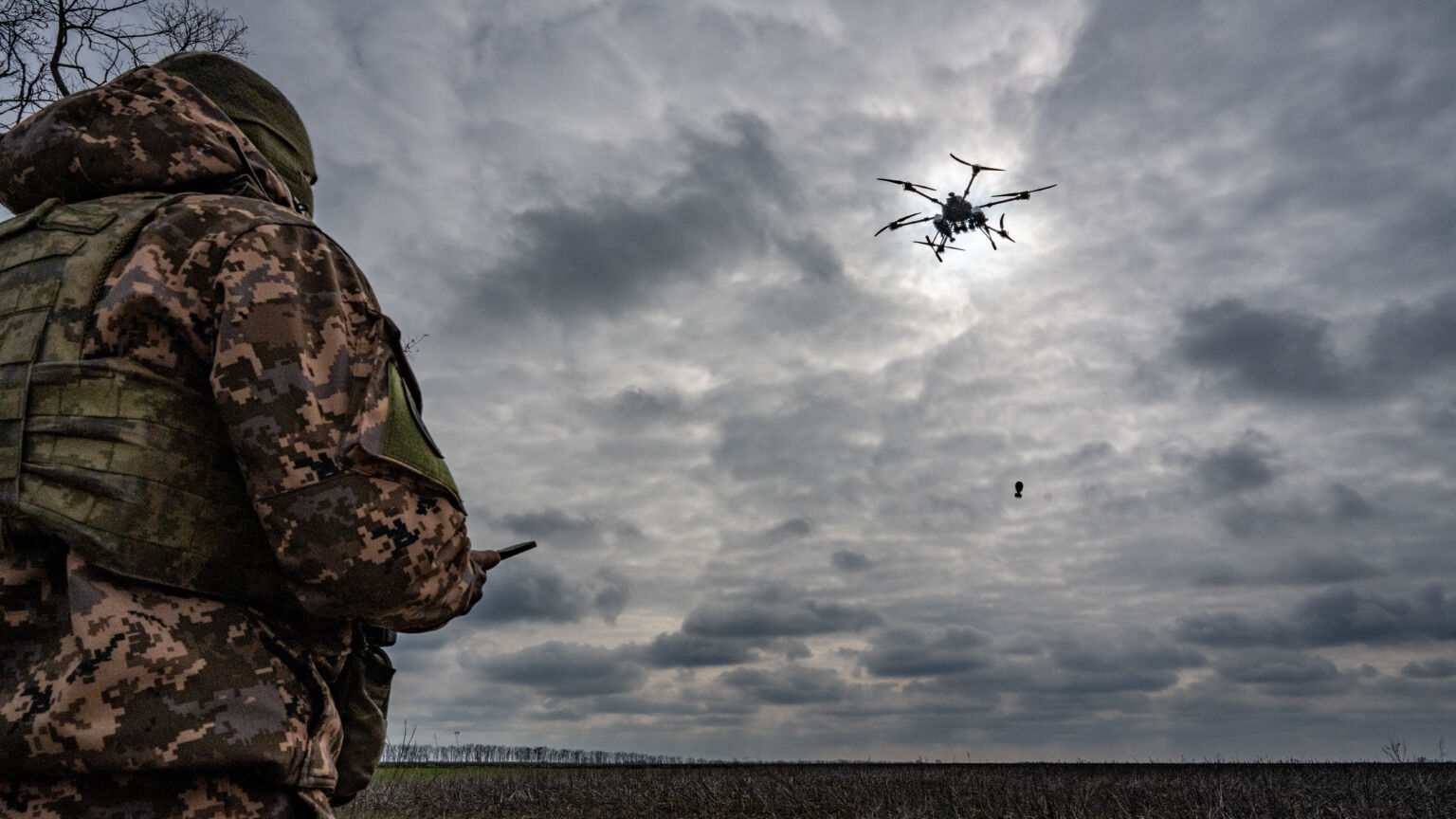The EU’s ‘drone wall’ is a flight of fancy
Europe doesn’t have the military or manufacturing capabilities to match its tough talk against Russia.

Want unlimited, ad-free access? Become a spiked supporter.
The European Union’s rhetoric on Ukraine has long been fantastical. After all, this is a bloc that talks of supporting Ukraine against Russia in the largest military engagement since the Second World War while barely producing any weapons of its own. Even the EU’s much-trumpeted initiative to supply Ukraine with artillery shells was only possible because of enormous imports from South Korea.
But the EU’s recent defence discussions have taken on an air of complete delusion. The focus of its political summit in Copenhagen this week – which was itself overshadowed by fears of drone incursions into Danish airspace – was three proposals which are a mix of total fantasy and willful ignorance.
The first is the idea of a ‘drone wall’. Following repeated incidents involving drones in EU members’ airspace (in Poland, Estonia, Romania and Denmark), some of which have been identified as Russian, EU leaders backed plans to boost anti-drone capabilities to secure its border regions. Even at a glance, the drone-wall plans – involving jamming tech, interceptor drones and mobile guns – are not remotely feasible. The EU’s eastern flank, depending on how you measure it, is over 5,000 kilometres long. It is simply not possible to protect a border of that length from drones in this way.
Moreover, the EU is not even in the race when it comes to drone production and anti-drone capabilities. Some German defence systems have shown promise in Ukraine, but the overall state of EU military readiness against drones is dire. Anecdotes from Ukrainian troops trained in EU countries are very revealing here: trainees have been bemused by the fact that EU militaries barely have or use drones, when even the smallest formations in the Ukrainian armed forces consider them a first-order priority.
The performance of Poland – perhaps now the EU’s strongest military – is also telling. Following drone incursions in Polish airspace, both Polish and NATO forces moved to intercept the drones. Yet out of an estimated 19 drones entering Polish airspace, only three were shot down. Some were undetected for at least a week.
Then there’s the lack of manufacturing capacity in Europe. This means that any increase in the EU’s drone numbers amounts to buying them from China. Current EU production is probably in the low thousands. So the EU is talking up creating a ‘drone wall’ for a 5,000 kilometre-long border without producing any drones.
The second proposal was to support Ukraine using frozen Russian assets – the profits on which are already being sent to Ukraine. As the European Commission sees it, these assets are close to a magic money tree, to be used to replace American military support for Ukraine. Its latest proposal involves using the assets to issue a €140 billion loan to Ukraine, transferring the assets to the European Commission in the process. Most serious member states see such a move as no-go for the simple reason that it would completely undermine Europe’s financial credibility. No matter how appalling Russia’s conduct is, the EU cannot simply confiscate billions of euros from a sovereign country. For this reason, Belgium, where the assets are currently held, opposes the move.
Yet the EU’s support for Ukraine hinges on this loan – without it, funding falls on the shoulders of either the already-overstretched EU budget, or the increasingly struggling economies of the member states. The focus on a measure that is in reality dead on arrival shows the delusional nature of the EU’s Ukraine policy.
But perhaps the most farcical proposal of all is the plan to fast-track Ukraine’s EU membership by removing member states’ veto. This was billed in the Brussels media as an innovative way to side-step Hungary’s concerns about Ukraine joining the EU. In reality, Hungarian prime minister Viktor Orbán is just an all too convenient bogeyman here. A large number of member-state leaders actually oppose the move. They are concerned about the cost of letting such a poor country join, and the threat Ukraine’s agricultural sector poses to existing members’ farming industries. But unlike Orbán, they are not willing to stick their heads above the parapet.
Regardless, this proposal is barely even worth discussing. It faces the same hurdles as Ukraine’s existing membership bid. That is, in order to change the rules to expedite Ukraine’s membership, all 27 member countries including Hungary would have to be in agreement and refrain from exercising their veto powers. Something that is not going to happen. This is the basic reality that EU leaders are either too stupid or too deranged to recognise.
The EU has failed once again to confront the seriousness of the situation on its own doorstep. We will soon be in the fourth year of Russia’s invasion of Ukraine and, other than a set of half-baked fantasies, EU countries have no better idea today on how to end this dreadful war than they did when it began.
Judging by this summit, the EU’s holiday from history is far from over – in fact, its leaders appear to be on an extended vacation in fairyland.
Jacob Reynolds is the head of policy at MCC Brussels.
You’ve hit your monthly free article limit.
Support spiked and get unlimited access.
Support spiked and get unlimited access
spiked is funded by readers like you. Only 0.1% of regular readers currently support us. If just 1% did, we could grow our team and step up the fight for free speech and democracy.
Become a spiked supporter and enjoy unlimited, ad-free access, bonus content and exclusive events – while helping to keep independent journalism alive.
Monthly support makes the biggest difference. Thank you.










Comments
Want to join the conversation?
Only spiked supporters and patrons, who donate regularly to us, can comment on our articles.